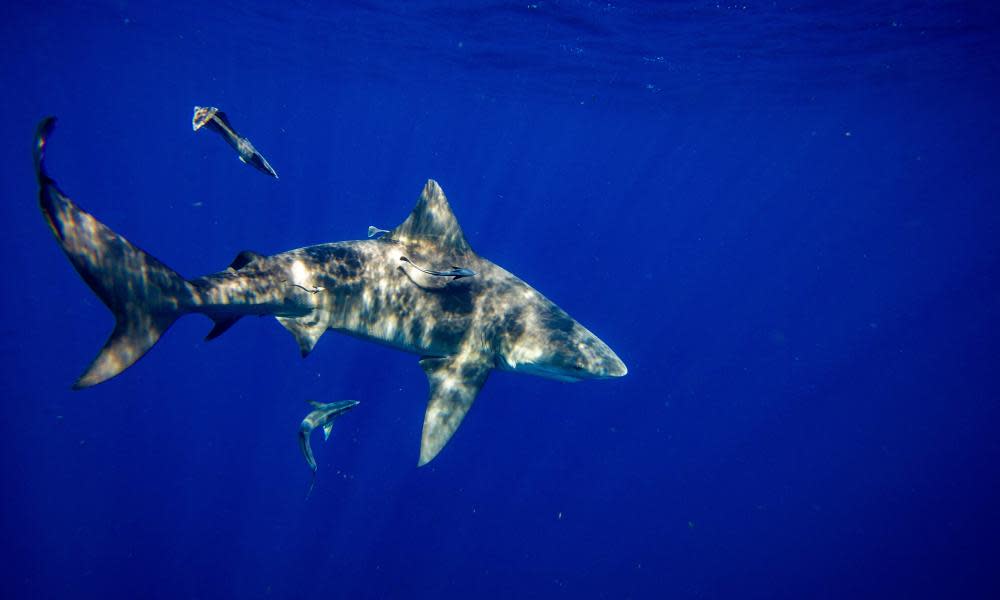Florida still world’s shark bite capital – but attacks on humans lowest in decade

Florida has retained its title as the shark bite capital of the world, according to new figures, but globally the number of such attacks on humans is at its joint lowest level for a decade.
Across the world there were 57 unprovoked shark bites in 2022, most of which occurred in the United States and Australia, said the University of Florida’s international shark attack file, a renowned resource that published its annual data on Monday.
Related: ‘Extinction crisis’ of sharks and rays to have devastating effect on other species, study finds
Of those, 16 took place in Florida, which recorded no fatalities but two amputations.
Five of the attacks worldwide were fatal – down from nine deaths in 2021 and 10 the previous year, the university’s researchers found.
“Generally speaking, the number of sharks in the world’s oceans has decreased, which may have contributed to recent lulls,” Gavin Naylor of the Florida Museum of Natural History said.
“It’s likely that fatalities are down because some areas have recently implemented rigorous beach safety protocols, especially in Australia,” said Naylor, the director of the Florida Program for Shark Research.
While the overall number matches the 2020 figure as the lowest over a 10-year span, there were regional “hotspots”. Among them was Long Island, New York, which saw a record number of eight – researchers believe those were mostly from juvenile sand tiger sharks drawn into the surf zone by an influx of baitfish.
“If fish are especially dense where people are swimming and visibility is poor, then it is more likely that young sharks, which lack the experience of older animals, will mistake a swimmer’s foot for their intended prey,” Naylor said.
The US as a whole saw most of the recorded bites with 41. One was fatal: a female snorkeler in Hawaii in December.
Australia had nine confirmed unprovoked bites, and single bites occurred in New Zealand, Thailand and Brazil, according to the research.
Two fatal attacks occurred on the same day in Egypt’s Red Sea, where shark encounters are considered rare. South Africa, which averages a few bites a year, had two unprovoked attacks in 2022, both of which were fatal and probably caused by white sharks.
Naylor said the shark attack file placed a strong emphasis on unprovoked bites and did not include cases probably prompted by mitigating circumstances, such as fishing lines in the vicinity of an attack or chum in the water.
There were 32 additional bites in 2022 that fit the file’s criteria “for having been intentionally or unintentionally provoked”, according to the data.
“Unprovoked bites give us significantly more insight into the biology and behavior of sharks,” Naylor said.
“Changing the environment such that sharks are drawn to the area in search of their natural food source might prompt them to bite humans when they otherwise wouldn’t.”
So far this year, at least two fatalities from shark attacks have been recorded globally: a diver who was decapitated off the Mexican coast in January, and a 16-year-old Australian girl who was bitten by a suspected bull shark in Perth’s Swan River this past weekend.
Despite the publicity such incidents garner, shark attacks on humans remain extremely rare.
According to the website floridapanhandle.com, which collates and maintains a rolling database of attacks independent of the University of Florida’s research, the fear of a shark bite outweighs the reality. Humans have a far higher chance of being killed by a flying champagne cork, accidental poisoning, or falling coconuts, that website says.
“The chances of being attacked by a shark are nearly zero,” the resource’s founder, David Angotti, said. “For people that live in the US, you are approximately 50 times more likely to die by a lightning strike, and 10 times more likely to die by a firework accident compared to a shark attack.”

 Yahoo Movies
Yahoo Movies 
